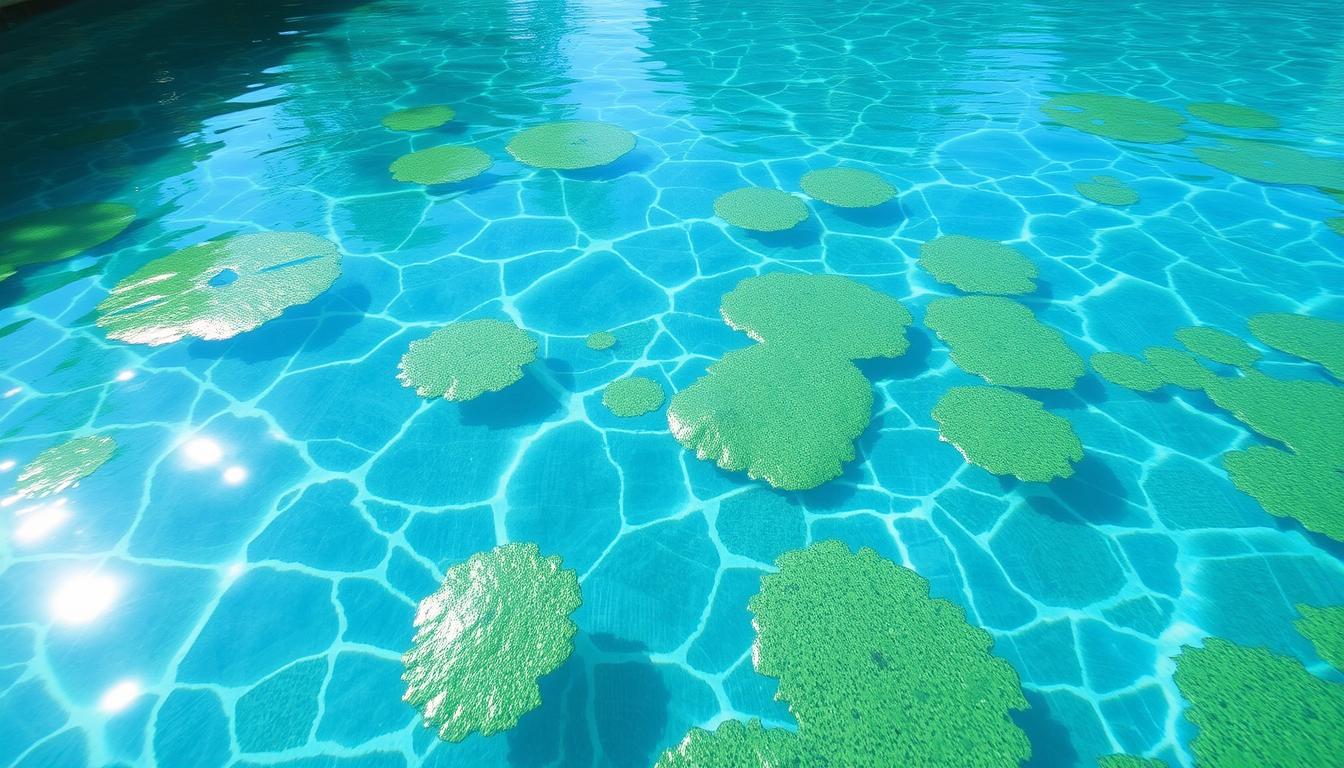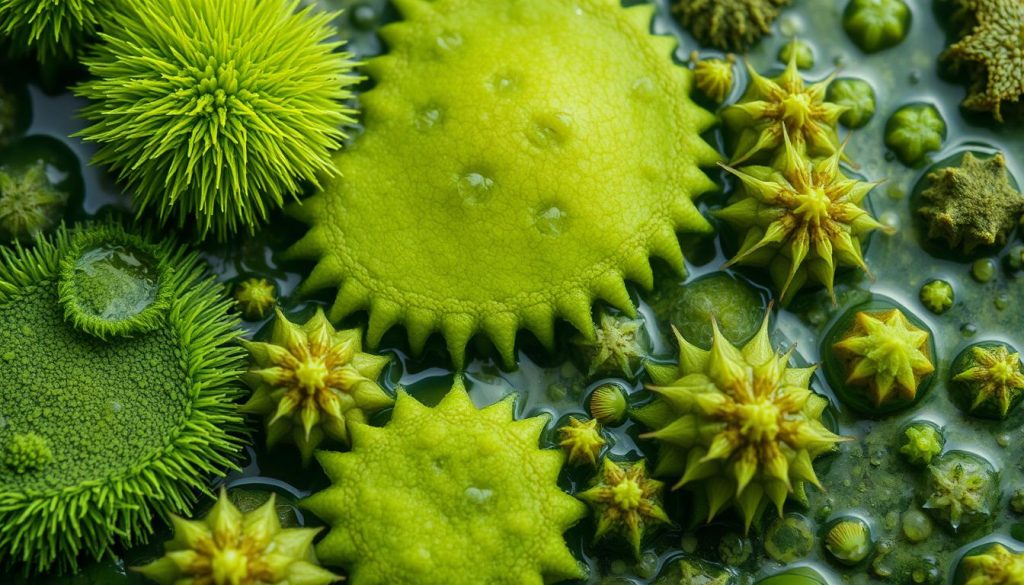
Over 21,000 types of algae exist, coming in green, yellow, pink, and black colors. A clean pool is a summer oasis. But algae can make it unsafe and unappealing. Pool algae is a worry for swimmers, affecting the pool’s look and function.
Algae grows in hot, sunny places with high pH or low chlorine levels. It can multiply fast, creating a home for harmful bacteria and bugs. Swimming in a pool with algae may not make you sick right away.
However, it can attract insects and harbor dangerous bacteria like E. coli. This could lead to illness. Black algae is especially concerning.
This guide explores pool algae, its types, and health effects. You’ll learn how to spot, prevent, and fight pool algae. We’ll show you how to keep your pool clean and safe for everyone.
Understanding Pool Algae
Pool algae is a common problem for many pool owners. These single-celled aquatic plants grow fast in warm conditions. They can cause algae in pool water hazards and pool algae exposure risks.
Understanding algae types is key for a safe swimming environment. Proper pool care helps prevent these issues.

What is Algae?
Algae are simple, aquatic plants that grow in various water bodies. They can multiply quickly with warm water, sunlight, and nutrients.
Wind, rain, dirty swimsuits, or pool gear can introduce algae to your pool. These plants can do photosynthesis, helping them thrive.
Common Types of Pool Algae
Several algae types can grow in your pool. Each has its own traits and risks:
- Green Algae: The most common type, making pool water green and cloudy. It grows fast in warm, poorly cleaned, or still water.
- Yellow or Mustard Algae: Common in warm areas, often in dark pool spots. Its beta-carotene makes it tough to remove.
- Black Algae: Actually a cyanobacteria, it looks like dark spots on pool surfaces. It’s harder to remove than green or yellow algae.
- Pink Algae: A slimy bacteria found in tropical areas or pools with special liners. It resists chlorine treatment.
Knowing your algae type helps choose the best treatment. It also prevents health risks from pool algae exposure.
Pool Conditions that Promote Algae Growth
Several factors can help algae grow in your pool. Good pool care and cleaning are crucial.
| Condition | Effect on Algae Growth |
|---|---|
| Warm Water | Algae thrive in warm water, with optimal growth occurring between 77°F and 86°F (25°C and 30°C). |
| Poor Sanitation | Inadequate chlorine levels or improper pH balance can create an environment that promotes algae growth. |
| Poor Circulation | Insufficient water circulation can lead to dead spots in your pool where algae can grow undisturbed. |
| Sunlight | Algae require sunlight for photosynthesis, and pools exposed to direct sunlight are more prone to algae growth. |
| Nutrients | Organic matter, such as leaves, debris, and swimmer waste, can provide nutrients that fuel algae growth. |
Knowing what helps algae grow lets you prevent water hazards. You can keep your pool clean and safe for swimming.
Take steps to stop algae in pool water hazards. This will help maintain a healthy swimming spot.
How Pool Algae Affects Swimmers and Pools
Pool algae is more than just an eyesore. It can breed harmful bacteria and damage pool surfaces and equipment. Let’s explore the health risks and pool damage caused by algae.
Health Risks Associated with Swimming in Algae-Infested Pools
Swimming in algae-filled pools can be dangerous. These pools are perfect for harmful bacteria to grow. This can lead to various health issues.
- Skin irritation and rashes
- Ear infections
- Eye infections, such as conjunctivitis
- Gastrointestinal issues, like diarrhea, if contaminated water is ingested
- Respiratory problems, such as coughing, wheezing, and chest tightness, due to exposure to harmful airborne chemicals
Swimming in untreated pool water can lead to Recreational Water Illnesses (RWIs) with symptoms such as gastrointestinal issues, skin infections, and respiratory problems.
To reduce health risks, maintain proper pool water chemistry. Address algae growth quickly. Test and adjust chlorine levels, pH, and other key factors regularly.
Damage Caused by Algae to Pool Equipment and Surfaces
Pool algae can harm surfaces and equipment. It can stain and discolor pool walls and floors. Algae can also etch and pit surfaces, especially black algae.
- Staining and discoloration of pool walls and floor
- Etching and pitting of pool surfaces, particularly with black algae
- Clogged filters and plumbing due to thick algae growth
- Reduced efficiency of pool equipment, such as pumps and heaters
Algae damage can be expensive to fix. It may require extensive cleaning or replacing affected parts. To prevent this, follow these maintenance tips:
| Pool Component | Maintenance Recommendation |
|---|---|
| Sand Filters | Change sand every 5 years (2 years with Baquacil) |
| Cartridge Filters | Replace elements every few years, depending on size |
| DE Filters | Soak grids in a water/bleach solution for maintenance |
| Pool Filter Upgrade | Consider a larger, more effective filter to reduce algae growth |
Effective filtration, sanitation, and circulation are key for pool algae prevention and maintaining a healthy swimming environment.
Is Pool Algae Harmful to Humans?
Swimming in algae-filled pools can pose serious health risks. These pools are ideal breeding grounds for bacteria. This can lead to various pool algae health problems.
Potential Bacterial Infections and Other Health Concerns
Bacteria thrive in warm, stagnant water. Algae-filled pools are perfect for harmful microorganisms. This can cause several health issues.
- Skin infections, such as itchy rashes and breaks in the skin
- Eye infections
- Respiratory infections
- Gastrointestinal issues, like diarrhea, from accidentally ingesting contaminated water
Some algae types harbor specific bacteria. This increases the risk of illness. Mustard algae can harbor E. coli.
Red algae, actually bacteria, can cause health problems if untreated. Green algae breeds bacteria that can cause skin infections.
| Type of Algae | Potential Health Risks |
|---|---|
| Mustard Algae | Can harbor E. coli bacteria |
| Red Algae (Bacteria) | Can cause illness if left untreated |
| Green Algae | Provides a breeding ground for bacteria that can cause skin infections |
Precautions to Take When Dealing with Pool Algae
Act quickly when you notice algae in your pool. Delay can make algae resistant to typical solutions. This includes chemical shocks or chlorine.
Take these precautions when dealing with pool algae:
- Avoid swimming in the pool until the algae has been properly treated and the water is clear
- Hire a professional pool maintenance service to assess the situation and develop a treatment plan
- Adhere to a regular testing and treatment schedule to prevent future algae infestations
- Address any underlying issues that may contribute to algae growth, such as poor circulation or inadequate filtration
Prompt action by professionals can improve water clarity, prevent accidents, and reduce the risks associated with swimming in pools contaminated with algae.
Treat pool algae safely to minimize health risks. This ensures a clean, enjoyable swimming environment. Your family and friends will thank you.
Conclusion
Pool algae can cause health risks and damage to pool surfaces if left untreated. It can harbor dangerous bacteria, leading to infections and rashes. Proper maintenance is crucial to prevent algae growth.
Maintain chemical balance by keeping chlorine levels between 1.0-3.0 PPM. Keep pH levels between 7.2-7.8 PPM. Total alkalinity should be 80-120 PPM, and calcium hardness 200-400 PPM.
Act quickly if you see green, yellow, or black discoloration in your pool. Different algae types require specific shock treatments. Green algae needs 2LB of calcium hypochlorite per 10,000 gallons.
Black algae requires 4LB per 10,000 gallons. Run your filtration system 22-24 hours daily until the water clears. This helps reduce algae growth chances.
Take proactive steps to prevent and treat pool algae for safe swimming. Regular maintenance and upgrading to a larger filter can be cost-effective. Stay vigilant to keep your pool algae-free for everyone’s health and enjoyment.







